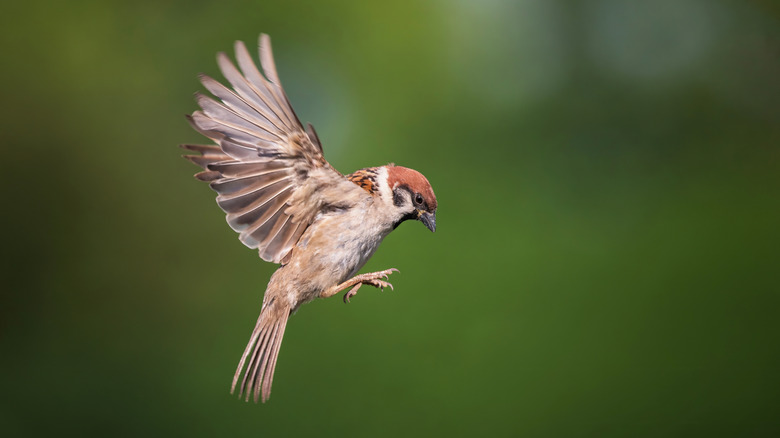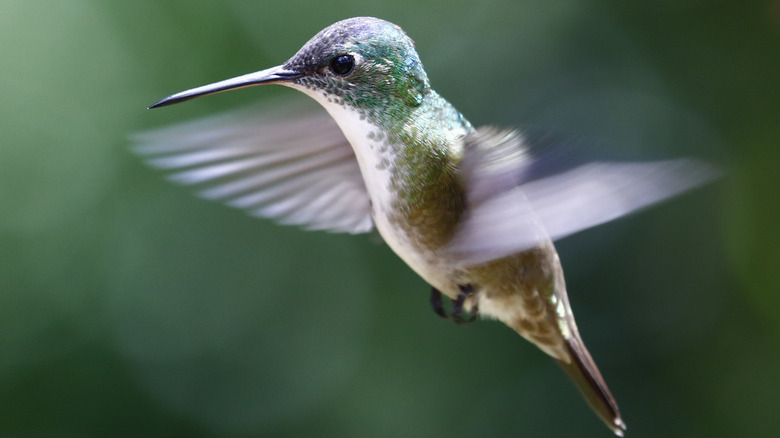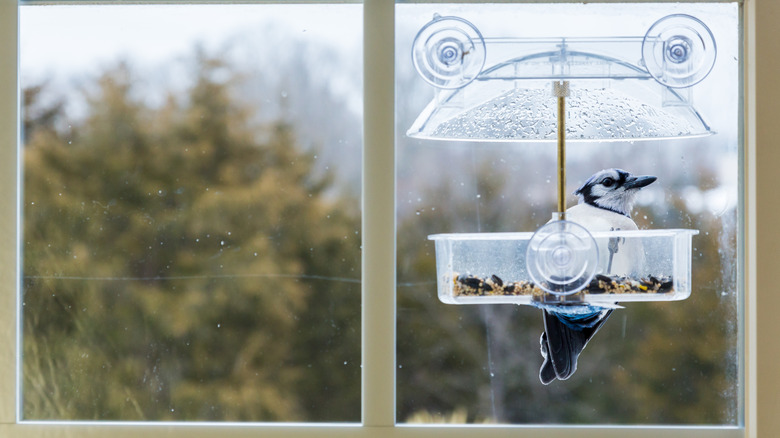Why Do Birds Fly Into Windows?
Collisions between birds and window panes are a frighteningly common tragedy. Every year in the U.S. alone, over 1 billion birds die from crashing into buildings. That's according to a 2024 study published in the journal PLOS One, which also found that building collisions have a 60% fatality rate for birds. Many of us have heard the sickening sound of a bird hitting our window, and witnessed the heartbreaking consequences, but why does this happen so very often? You might assume that birds fly into windows because windows are clear, and the birds think they can simply fly through the space, but that's not really the case.
It isn't the transparent property of glass that makes it so dangerous to birds: it's actually its reflective ability. If your window looks out on trees or other plants, it can reflect the foliage, making it look inviting to nesting finches and other birds looking for a roost. Mistaking the reflection for actual trees, the birds intentionally veer towards windows, not recognizing the illusion until it is too late.
Sometimes, birds will even attack windows, mistaking their own reflection for another bird. This typically happens around springtime, the start of bird reproduction season, when males are aggressively staking out their territory. Confusion over reflections can turn deadly, and for some birds, the risk is higher than others. Fortunately, there are ways to protect our fine feathered friends.
Which birds are most at risk?
Some bird species are more likely to collide with windows than others, with small species like sparrows, warblers, and hummingbirds being amongst the most common victims. A 2020 study published in the journal Conservation Biology compiled data on bird collisions from the United States, Canada, and Mexico and found that three factors were particularly associated with risk of flying into buildings. Firstly, birds that are native to woodland habitats collide with buildings more frequently than non-woodland birds. Trees reflected in window panes can easily fool woodland species into thinking they've spotted a nice place to roost.
The study also found that insectivores were more likely to have collisions, which the study authors attribute to the fact that insectivores practice a hunting technique called foliage gleaning, wherein they methodically move along a tree from branch to branch, poring over each leaf for insects. Foliage gleaners searching for a tree to forage in can be led astray by the reflection of trees, causing deadly consequences.
Lastly, migrating birds are more likely to have collisions, specifically those that migrate at night. Light pollution in cities, including lights reflecting off of windows, confuse nocturnal birds that use the stars for guidance as they travel long distances. Trying to navigate cities is, in general, a tiresome task for birds, who often have to land in urban spaces to catch a breather. When they take off again, they aim for the nearest patch of open sky, which could be a reflection from a window.
How to prevent birds from colliding with windows
Windows are a significant danger to many birds that share space with human settlements, but fortunately, there are ways to protect against fatal collisions. The most effective approach is to make your windows less reflective, which can be accomplished in a few different ways. Using patterned glass or decals prevents the window from reflecting a clear, uniform image, making it an effective bird deterrent. You can also get one-way transparent film, which tints your window glass so that you can see out, but others can't see in: good for keeping birds and nosy neighbors away.
If you have screens over your windows, you already have an effective means of keeping birds safe from crashing into your house. Window frames with more muntins (the divider between window panes) are also advantageous, as they keep the window from appearing like one big mirror. The easiest thing you can do to keep birds around your house safe is to draw the curtains or close the blinds every time you leave a room.
One way to prevent birds from hitting your windows may surprise you: putting a bird feeder or bird bath near the window, or even using a window-mounted feeder. The logic behind this move is that birds will home in on the bath or feeder and head for it rather than your window. When they take off again, being close to the window means they don't have enough space to reach flying speeds that would hurt them if they bumped into the glass.


